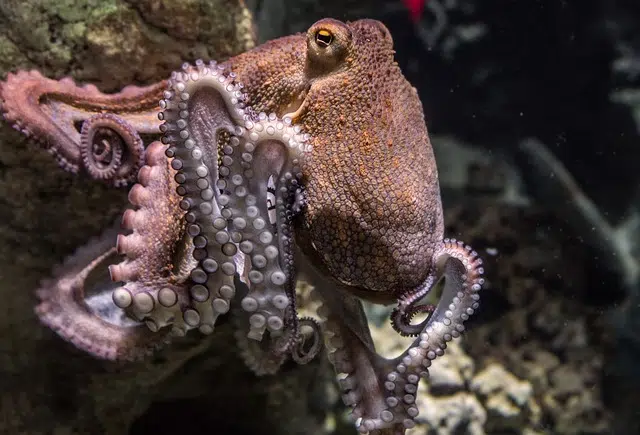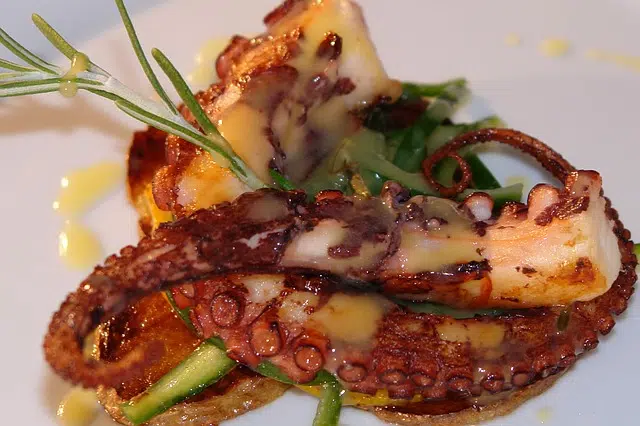
Octopuses are mollusks that have eight tentacles.
An octopus is an invertebrate aquatic animal , which is part of the mollusk phylum. It has a soft body, without a shell to protect it, and has eight tentacles . Because of this characteristic, octopuses are also known as octopods .
These tentacles have suction cups that are adherent. Octopuses also have three hearts: a pair of them is responsible for bringing blood to the gills, while the remaining one promotes circulation to other body regions.
Octopus characteristics
Other important characteristics within the octopus organism are the presence of a type of siphon that allows it to expel water to move forward and a reserve of ink that the animal uses to flee from predators.
Octopuses are carnivores and usually hunt at night. Bivalve organisms, small crustaceans and certain fish are part of this animal's diet . The octopus, then, usually feeds on mollusks, lobsters and crabs. It has powerful jaws and poisonous saliva that allows it to render its prey motionless.
In turn, the octopus can be attacked by large fish such as grouper or conger eel. To protect itself, it usually spends much of the day hidden among rocks or in caves, and even resorts to camouflage.

Octopus meat is rich in iron, phosphorus, potassium, vitamin B and selenium.
A valued meat
Octopus meat is highly appreciated in various countries.
It provides selenium , potassium , phosphorus , iron and vitamin B , among other nutrients. A negative factor from a nutritional point of view, octopus has a high amount of sodium and cholesterol .
Intelligence and appearance of the octopus
It should be noted that the octopus is an animal of great intelligence , which shows good memory and the ability to solve problems that arise along the way. It also has the ability to imitate the behavior of other animals.
The appearance of the octopus has been reason enough to make it the antagonist of more than one horror story, both in its original form and in fantasy versions. However, its enormous eyes, its eight tentacles and its large head are not the main reason why this living being stands out, but its most admirable feature is the skill with which it deceives its enemies and escapes from them.
Defensive tactics
The octopus has several very effective tactics to save its life when attacked by its predators, either by avoiding the encounter or by frustrating the attempts of others. His most notable technique consists of hiding without leaving the scene , in front of the enemy's eyes; Thanks to the network of specialized muscles and pigment cells in its skin, it is able to blend in almost instantly with its environment, adapting to the shapes and imitating the colors and textures of the elements that surround it.
According to records, it seems that predators such as eels, dolphins and sharks can completely ignore the presence of an octopus that blends into its surroundings, even if they swim past it . But luck is not always on your side; When they discover it, their ace up their sleeve is its characteristic ink, which serves to prevent them from seeing it clearly and reduce the olfactory ability of its attackers, so that it is also difficult for them to track it .
As if all this were not enough, the octopus is capable of swimming at high speed, since it can propel itself by expelling water through its mantle. Furthermore, since its body is very flexible, it can enter small crevices and cracks, almost infallibly outwitting its robust predators. When they catch it by one of its tentacles, it can detach itself from it and regenerate it after a while, without this causing irreversible problems.
